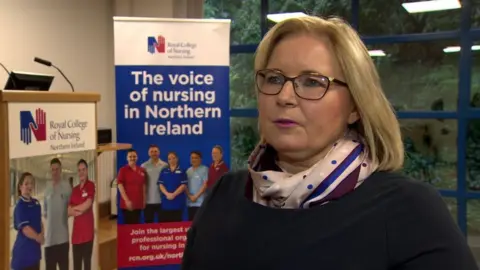Covid-19: Nurses reissue call for safe staffing levels one year after strike
 Pacemaker
PacemakerMore needs to be done to tackle safe staffing levels in Northern Ireland's health service, according to the Royal College of Nursing (RCN).
A year on from the nurses' strike, the union has warned that problems caused by poor workforce planning and chronic underfunding have not been addressed.
Instead they have been exacerbated by the Covid-19 pandemic, said the RCN.
The Department of Health said dealing with staff shortfalls was a "key priority" for the health minister.
Pat Cullen, the Northern Ireland director of the RCN, said "very little has actually changed" since about 15,000 healthcare workers took to the picket line in December last year for a series of protests over pay and safe staffing levels.
"We need to remind the government that many of these issues have sadly not gone away," she added.
"The pressures that were caused by not have enough nurses have been fiercely highlighted through the pandemic.
"It is not just the case that we have struggled because of the impact of Covid-19 - because we started out in a worse position it has made it doubly-difficult to deal with."
'Much more to do'
The department said the pandemic had "starkly highlighted the need for sustained investment" in the healthcare workforce.
"Staffing shortfalls, of course, were a major problem before this virus," it added.

It also highlighted "significant" improvements in the nursing, midwifery and support staff vacancies which, it said, are now at levels last seen three years ago.
The number of nursing and midwifery university places has also jumped to an all time high this year of 1,325, according to the health department.
"There is much more to do, of course, to reclaim lost ground but the commitment is there and it's bearing dividends," said the department.
'No compromise on agreement'
The problem of pay and funding for nurses and healthcare staff dates back to about 2010.
December last year was the first time RCN's 103-year history that its members had gone on strike.
In March it was announced that money docked from staff wages during the industrial action would be repaid.
But a proposal to reimburse those who lost pay was only approved by the Stormont Executive this month.
Ms Cullen added: "While we have seen the commitment to increased numbers of pre-registration nursing students being fulfilled, we have yet to see meaningful progress in relation to safe nurse staffing legislation becoming a reality.
"This was a key point of the agreement that led nursing staff to suspend strike action and cannot be comprised upon."
The department said it was committed to addressing the issue of safe staffing legislation and that a working group, comprising departmental officials and trade unions, had been set up.
The department added that it was working with health trusts to ensure the system could meet the "exceptional demands" of the Covid-19 pandemic.
It said 1,500 new appointments had been made as a result of the recent workforce appeal to boost the health service.
